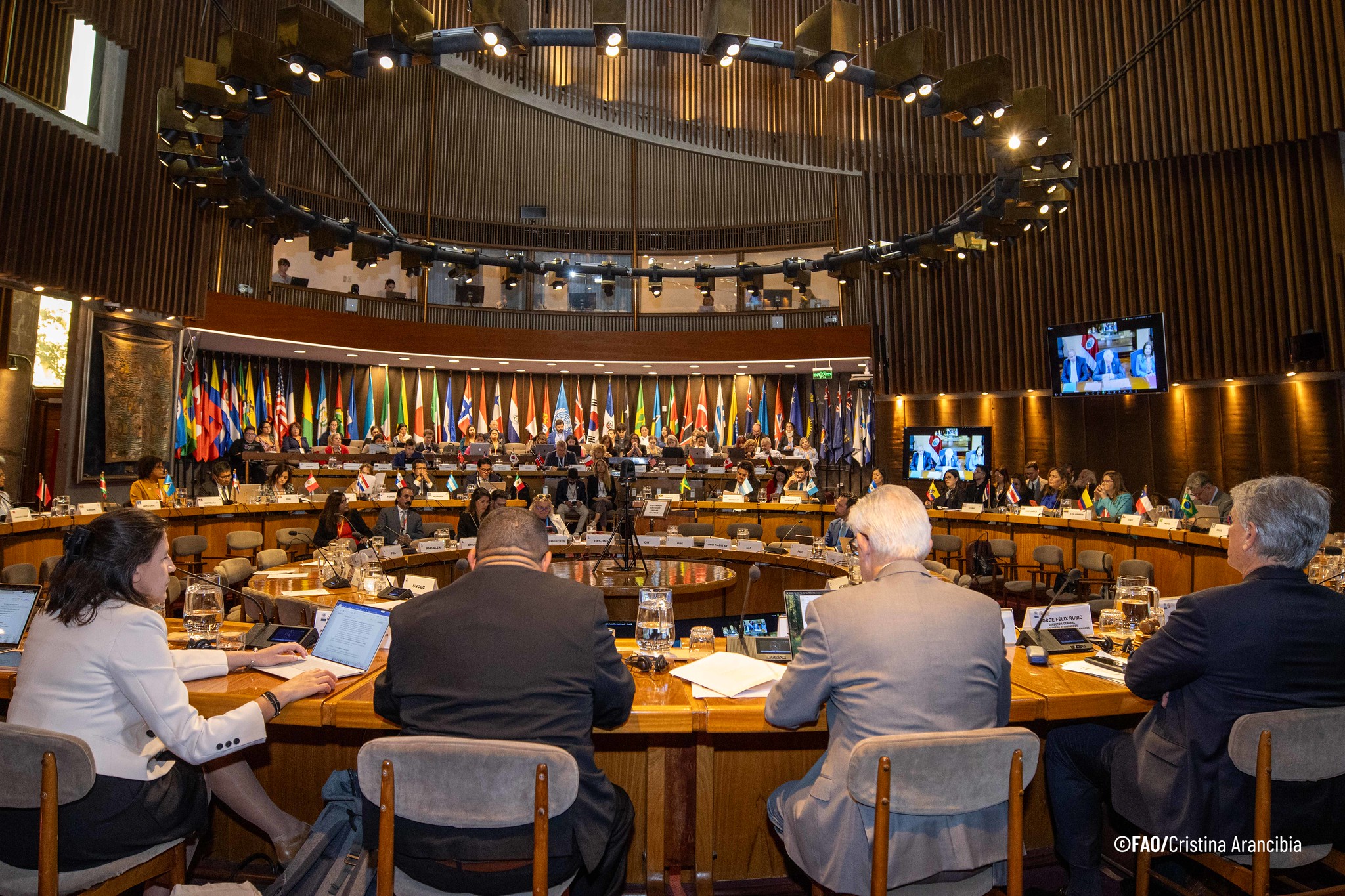FAO promotes solutions for more equitable and sustainable agrifood systems at a regional forum on the 2030 Agenda
The Organization led a series of side events during the eighth meeting of the Forum of the Countries of Latin America and the Caribbean on Sustainable Development 2025, addressing key issues such as sustainable trade, gender equality, youth participation, and the role of Afro-descendant peoples in agrifood systems

©FAO/Cristina Arancibia
The Food and Agriculture Organization of the United Nations (FAO) highlighted the urgency of transforming agrifood systems to achieve the 2030 Agenda during the eighth meeting of the Latin America and the Caribbean Forum on Sustainable Development 2025, organized by ECLAC.
FAO was represented by Maya Takayi, Regional Technical Leader, who stated: “FAO estimates that closing the gender gap in agricultural productivity could increase global GDP by USD 1 trillion and reduce food insecurity for 45 million people. Meanwhile, the number of overexploited fish populations continues to grow, which calls for urgent action towards sustainable resource management. We must accelerate progress on several critical and interconnected SDG targets.”
The UN specialized agency participated in key discussions on: the One Health approach (SDG 3) to improve health outcomes; transformative gender equality policies to secure women’s access to land and financial services (SDG 5); decent employment opportunities for youth and vulnerable groups, while eliminating child labour in agriculture (SDG 8); ecosystem-based, science-driven fisheries management and empowerment of small-scale operators (SDG 14); and strengthening science–policy linkages through multi-stakeholder partnerships and innovative financing mechanisms (SDG 17).
FAO also organized six side events aimed at fostering dialogue on how to accelerate progress towards the 2030 Agenda across multiple thematic areas:
Due diligence for sustainable trade between Latin America and the Caribbean and the European Union
The event addressed the challenges and opportunities of international trade, focusing particularly on the European Union’s deforestation regulation and its implications for coffee and cocoa producers and exporters.
Tomislav Ivancic, Senior FAO Markets and Trade Advisor, highlighted the launch of the FAO/OECD Deforestation Due Diligence Manual for Agricultural Value Chains, aimed at bridging knowledge gaps on implementing highly technical standards. FAO’s Agro-food Trade Specialist for LAC, Camilo Navarro, emphasized that “coordinating trade, agriculture, and the environment is no longer optional for the region – it is a necessity for a viable future,” one that requires the commitment of the private sector, civil society, and governments.
The role of women in healthy diets: challenges, solutions, and opportunities for equitable food systems transformation
FAO, the UN Food Systems Coordination Hub, and the Inter-Agency Working Group on Food Systems showcased tangible solutions to advance rural women’s rights to healthy diets. Key cases presented included Uruguay’s national plan and Chile’s food-based dietary guidelines, which have improved women’s access to adequate nutrition and helped drive the equitable transformation of agrifood and care systems.
The event also featured contributions from academia, especially on the importance of disaggregated data to better reflect the realities of rural, Indigenous, young, and Afro-descendant women.
Youth and women leading change in agrifood systems
FAO, PARLASUR, and the Youth and the World Action Initiative convened youth leaders from across Latin America and the Caribbean to expand and institutionalize youth participation in agrifood systems governance. The discussions focused on youth empowerment—particularly for young women—and promoted innovative platforms such as National Youth Chapters of the World Food Forum (WFF) and strategic alliances with FAO, the Spanish Agency for International Development Cooperation (AECID), Mercosur-Parlasur, and the Parliamentary Front Against Hunger in Latin America and the Caribbean.
Afro-descendant peoples in Latin America and the Caribbean: exploring social and territorial realities in rural areas
FAO and ECLAC launched the report “Afro-descendants in Latin America and the Caribbean: An Approach to Social and Territorial Realities in Rural Areas.” Enriched by input from governments, civil society, and Afro-descendant organizations, the report sheds light on the presence and contributions of Afro-descendant peoples in rural areas across the region. It also highlights the challenges they face—such as limited statistical visibility, lack of recognition, and barriers to accessing basic services and justice—along with persistent policy gaps.
Reimagining the future of women in food systems: leveraging science, technology, and partnerships to advance the SDGs
As part of the follow-up process to the UN Food Systems Summit (UNFSS+4), FAO and the Inter-Agency Working Group for Latin America and the Caribbean assessed successful initiatives using science, technology, and disaggregated data to remove barriers and empower women in agrifood systems. The dialogue reinforced global commitments to SDG 5 and its intersections with other key SDGs (3, 8, and 17), ensuring that no woman is left behind in the transformation of agrifood systems.
